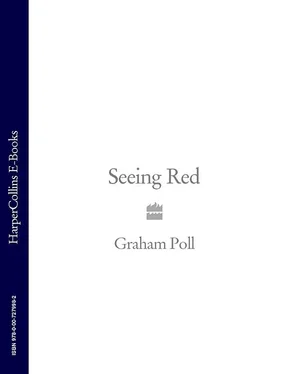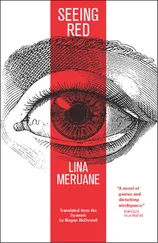Then I imposed a segment of tight refereeing. I whistled for every infringement, to close the game down, and let tempers cool. Sky television ‘expert’ Andy Gray told viewers, ‘Referees have been successful this season because they have played “advantage”, except for Graham Poll.’ That just shows you that you can know a lot about football without understanding anything at all about the job of referees.
Fergie must have stirred up his men at half-time because they started the second period with extra commitment and I had to caution two of them within about five minutes. Now, I did not want to make anyone miss the Cup Final. If someone punched an opponent, or did something really awful, then I would have sent him off, of course, and he would have been suspended for the Cup Final. But for situations which I could manage with cautions, I just gave cautions. To be scrupulously fair, I applied the same principle to fringe players who were unlikely to be involved in the Cup Final. In other words, I refereed both teams in exactly the same way, within the spirit of the game but with one eye on the Cup Final.
Was that the right thing to do? You can discuss it among yourselves. I believe it was exactly the right thing to do, although those ‘experts’ who always claimed that I deliberately sought out controversy might like to ponder my approach. If I had wanted controversy, I would have sent a couple of players off, preventing them playing at Wembley and made sure I was the centre of attention again. Yet the truth is that, throughout my career, I never made a decision because it was controversial. I frequently had to make decisions despite them being controversial. On that night in May 2007 at Stamford Bridge, I most definitely did not seek the confrontation with José Mourinho which erupted in the second half.
Chris Eagles had put in a bad tackle on Shaun Wright-Phillips but the Chelsea player got straight up, made no fuss and was not badly hurt. Working to the same principle that I had with the Chelsea players, I showed Eagles a yellow card instead of the red which his foul might have earned in another match. Mourinho was up and looking apoplectic in his technical area, as Sir Alex had been in the first half. That was OK. That was understandable. But what happened next was not acceptable.
The Chelsea manager made deliberate eye contact with me from twenty yards away and hurled abuse at me. I went towards him, not to ‘get on the camera’, as some claimed, ludicrously – the cameras were on me all the time – but to calm him down. I accepted that he was overwrought. After all, as pundits are wont to say, football is a passionate game, and most managers swear at the referee from time to time. Some of them – Sam Allardyce and David Moyes come to mind – can have a right go at a ref in the heat of the moment. Some, like Sir Alex Ferguson, have mellowed with age and consistent success. Arsène Wenger was very calm during successful seasons but entirely different during less successful seasons. So it is often all about stress.
Perhaps, throughout my career, I should have adopted a more stern approach. Perhaps, if referees had more backing from the FA, we would send managers off as soon as they tell us to f*** off. Then, perhaps, the routine abuse would stop.
Anyway, back in the real world, I approached José, assuming that he was just reacting to the pressure of his situation. I wanted to say, ‘José, you are under pressure, which I respect. But I would like you to respect me. Please be careful what you say to me.’ That is what I wanted to say and it is what I would have said to any other manager in that situation. Nineteen other Premiership managers would have responded to the calm man-management by apologizing, or at least by stopping swearing for a while.
But before I could say anything at all to Senhor Mourinho, he leant his head into me and produced a foul tirade which included a disgraceful personal comment about me and Sir Alex Ferguson. I was stunned. I was appalled. The inference was bad enough – that I was favouring Manchester United – but the way he expressed himself was just awful.
A test I often apply to myself is this: would I be happy explaining this behaviour to my family? Do you think José Mourinho would have been proud that night to have gone home and said to his wife and children, ‘Guess what I said to Graham Poll’?
Immediately after his despicable outburst, and before I could respond, he retreated to the back of the technical area and climbed into the seating behind the dugout, as if he had been sent off. Why did he do that? Perhaps José Mourinho thought he deserved to be ‘sent off’ that night and perhaps he wanted another dispute between Graham Poll and Chelsea.
I understand the pressure he was under and, as I say, other managers tried to apply psychological pressure and other managers swore at me without much restraint. I expected Mourinho, who is a fighter and wants to win everything, to go further than most – but not that far. Nobody in my twenty-seven seasons had used such deeply offensive language to insult and abuse me.
Yet, as I stood there, still in shock at the verbal assault I had suffered and looking on as Mourinho clambered into the seats behind the dugout, I thought to myself, ‘I do not need this hassle … I have got three games left after this. I do not want to spend weeks and possibly months after that waiting for a disciplinary hearing for José Mourinho, at which he will get the equivalent of a slap on the wrist.’ So I did not send him off. If that was a dereliction of my responsibility, then I apologize. But before you ask yourself whether I was wrong, ask two other questions. Firstly, was it right that José Mourinho should behave like that? Secondly, was it right that he was confident that he would get away with it – that any sanction imposed by the FA would not seriously inconvenience him or his club? I think it is a terrible indictment of the Football Association that a referee suffered that filthy defilement and yet concluded that there was no point in responding.
Because of events in my last season – John Terry’s inaccurate account of his sending off and José Mourinho’s grotesque verbal attack on me – there is a danger of this book turning into me versus Chelsea. But other referees will tell you similar stories about other clubs and, while I certainly think that the actions of JT and JM were unforgivable, I have no doubt that they were encouraged to behave as they did by the contemptibly timid Football Association.
So, as I stood there nonplussed by Mourinho’s outburst I felt it was simply not worth the grief to respond. It was not worth getting fifty foul letters to my home from Chelsea supporters saying that I was this and I was that – which I knew from past experience is what would have happened. Yes, I was a referee, but I was also a man with a young family. I did not want threatening letters arriving at my family home.
Steve Clarke, Chelsea’s assistant manager, thought I had sent off his boss, and accused me of doing it for the cameras and loving the attention.
John Terry made it his business to come over to the side of the field and give me an earful. His theme was identical to Steve Clarke’s – so much so that it made me wonder whether it was a key message that Chelsea had decided in advance. Was it a premeditated campaign? And did John Terry want a yellow card from me, to provoke more controversy and to suggest that our dispute earlier in the season was because of bias or animosity?
I used my lip-microphone to say to the fourth official, Mark Clattenburg, ‘Make it clear to Mr Mourinho that he has not been sent away from the technical area.’ I also told John Terry that I had not sent off his manager, but at this stage he wasn’t prepared to listen to anything I had to say.
Читать дальше












